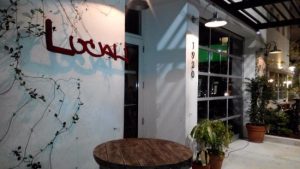Every candidate for national election must pass through Iowa and New Hampshire. And every candidate must also pass through Versailles. To carry Versailles is metonymically to win the favor of the Cuban exiles, a group that still wields considerable power throughout Miami. Candidates as far removed as Mitt Romney and Bill Clinton have held court there. No doubt the sixty-five hopefuls for 2016 will sit in the coming months for the obligatory arroz con pollo.
The restaurant has stood on Calle Ocho, a road connecting Tampa and Miami by way of 200 miles of swamp and sawgrass, since 1971. Versailles has only grown in stature over the years. I don’t really know how it got the name; presumably a bunch of cubanos got together and decided that if you put up enough mirrors, Louis XIV wouldn’t be able to tell the difference.
A little east of the main dining hall is the ventanita, the little window, the locus amœnus of the Cuban polis where exiles still meet to stand, take their coffee ($1, without Starbucks’s prices or righteousness), and complain about Fidel.
Behind them is a small plaque to the Peña de Versailles. The word peña is untranslatable, but it’s more or less a group of like-minded men who gather for friendship and philosophy – think of the Inklings, and add cigars. Here are the words on the plaque, which I translate by keeping the original eccentric punctuation and line breaks:
IN RECOGNITION OF THE CUBANS;
MEN AND WOMEN WHO NEVER
RESIGNED TO LIVE WITHOUT LIBERTY
WHO DAILY GATHERED
IN THE VERSAILLES RESTAURANT
PATRIOTIC AND
CULTURAL CENTER OF EXILE.
TO EXPOUND IDEAS AND SHARE
THE DREAM OF A RETURN
TO A FATHERLAND THAT WAITS.
The Fatherland does not wait. The university-age generation that fled the Castro tyranny is the oldest that still lives. And they, too, are mostly gone. Those that remain talk of going back, but most surely know that can never be. There is no Cuba there. The old men do not have the strength to return, stoop, and build up with worn-out tools a culture in ruin.
Nietzsche said very little to recommend him, but on this point he was right: only the lower animals grow back their limbs. These old men who gather for their coffee are not scorpions, and cannot through any natural means be freed of the hurt of their exile. They are amputees, as any of us surely would be if one day someone seething with malice and ambition stirred the envy of our neighbors to turn the body politic upon itself like a serpent cannibalizing its tail.
Nobody’s in a rush at Versailles, any more than anyone’s in a rush at Rick’s in Casablanca, because in the end, there’s nowhere left to go. So the old men sit and chat. They tell the same story until nobody’s sure whose it was to begin with. They flirt with the waitresses, even the unattractive ones. In fact, especially the unattractive ones.
I once overheard a waiter in Orlando ask my grandmother if she was Cuban. I’ll never forget the reply, in clear though accented English: “no. I am an American.” She said it twice to make sure she was understood. It was an awesome moment in the old sense of the word: I felt the deep ache of pride at once for my grandmother and for the country that welcomed her. Many Miamians from old families criticize the Cubans for their resistance to the native culture. Some of the criticism is surely deserved, but I always ask them to remember that on any given day, you can walk by the la ventanita and see the old men with American flags pinned to their guayaberas. They love this country; they speak with gratitude for our blessings of freedom and wealth; they hold the anti-patriot in passionate, vocal, and sometimes delightfully obscene contempt. And now, 50 years after they escaped with their lives and little else, they feel Versailles is not just a place to talk of home; Versailles is home.



